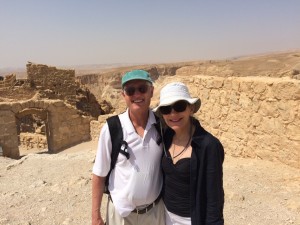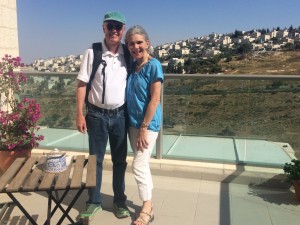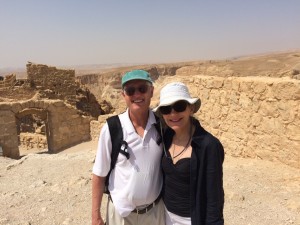 Jason Brown, a 29-year-old center for the St. Louis Rams, had a five-year, $37 million contract to play football. At one point, he decided that playing football was not giving meaning to his life. He resigned and gave up the balance of his contract. His agent told him he was making the biggest mistake of his life. Brown disagreed. He bought 1000 acres in North Carolina and is now a farmer. He believes that God has called him to be a farmer, and gives the first fruits of what he produces to the poor. The sacrifice he made financially is somewhere around $12 million. [1]
Jason Brown, a 29-year-old center for the St. Louis Rams, had a five-year, $37 million contract to play football. At one point, he decided that playing football was not giving meaning to his life. He resigned and gave up the balance of his contract. His agent told him he was making the biggest mistake of his life. Brown disagreed. He bought 1000 acres in North Carolina and is now a farmer. He believes that God has called him to be a farmer, and gives the first fruits of what he produces to the poor. The sacrifice he made financially is somewhere around $12 million. [1]
It was interesting to read the article and the comments that were posted. Some people felt Brown made a mistake. In their mind, he could have given away 10 percent or more of $12 million and helped a lot of people. On the other hand, a good number of people agreed with Brown’s decision. Many of them focused on the lifestyle of an NFL football player and lifestyle of a farmer, who can be closer to his family and children. In fact, spending time with his family, was one of the reasons Brown made his decision. Very few people focused on the fact that Brown felt called to change his lifestyle and be generous to the poor.
Over the years, I’ve listened to thirty or so stewardship sermons, and I’ve preached about twenty-five or thirty such sermons over the years. From being a layman, I think I know how difficult it is to listen to stewardship sermons, and I know how difficult it is to preach them from being a pastor. Nevertheless, we do need to talk about money and stewardship, because the financial decisions we make are also spiritual decisions. Money is not all there is to the spiritual life, but it is an important part of growing as a disciple. The spiritual gift of generosity is a gift God wants us all to have.
Paul’s Teachings on Stewardship
 Around the middle of the First Century, there was a famine in Israel. The Jewish people, and especially Christians, fell into poverty. The Apostle Paul decided to take up an offering to be given to the church in Jerusalem. Therefore, he began raising the money among the churches of Greece. [2] Paul put Titus, a trusted associate, in charge (2 Corinthians 8:6, 16-17). He also associated with Titus and unnamed brother who was respected by all the churches (v. 18). Paul desired for the church in Corinth to support this offering. He therefore devoted a portion of the letter we call “Second Corinthians” to encouraging the Corinthians in developing the grace of generosity. Our text today comes from Second Corinthians Chapter Nine, verses 6-15.
Around the middle of the First Century, there was a famine in Israel. The Jewish people, and especially Christians, fell into poverty. The Apostle Paul decided to take up an offering to be given to the church in Jerusalem. Therefore, he began raising the money among the churches of Greece. [2] Paul put Titus, a trusted associate, in charge (2 Corinthians 8:6, 16-17). He also associated with Titus and unnamed brother who was respected by all the churches (v. 18). Paul desired for the church in Corinth to support this offering. He therefore devoted a portion of the letter we call “Second Corinthians” to encouraging the Corinthians in developing the grace of generosity. Our text today comes from Second Corinthians Chapter Nine, verses 6-15.
Remember this: Whoever sows sparingly will also reap sparingly, and whoever sows generously will also reap generously. Each of you should give what you have decided in your heart to give, not reluctantly or under compulsion, for God loves a cheerful giver. And God is able to bless you abundantly, so that in all things at all times, having all that you need, you will abound in every good work. As it is written:
“They have freely scattered their gifts to the poor;
their righteousness endures forever.”
Now he who supplies seed to the sower and bread for food will also supply and increase your store of seed and will enlarge the harvest of your righteousness. You will be enriched in every way so that you can be generous on every occasion, and through us your generosity will result in thanksgiving to God. This service that you perform is not only supplying the needs of the Lord’s people but is also overflowing in many expressions of thanks to God. Because of the service by which you have proved yourselves, others will praise God for the obedience that accompanies your confession of the gospel of Christ, and for your generosity in sharing with them and with everyone else. And in their prayers for you their hearts will go out to you, because of the surpassing grace God has given you. Thanks be to God for his indescribable gift! (2 Corinthians 9:6-15).
Let us pray: Generous God: You sent us your Only Begotten Son, though he was rich, dwelling in truth and love as part of the Holy Trinity. He came and dwelt among us that we might see in this act of generosity what it means to be truly and fully human. Come now and fill us with your spirit so that we might become a fully human, generous people. Amen.
A Generous Fellowship
From the very beginning, the Christian church has been characterized by a supernatural generosity. Here is how the early church is described in Acts:
 They devoted themselves to the apostles’ teaching and to fellowship, to the breaking of bread and to prayer. Everyone was filled with awe at the many wonders and signs performed by the apostles. All the believers were together and had everything in common. They sold property and possessions to give to anyone who had need. Every day they continued to meet together in the temple courts. They broke bread in their homes and ate together with glad and sincere hearts, praising God and enjoying the favor of all the people. And the Lord added to their number daily those who were being saved (Acts 2:42-47).
They devoted themselves to the apostles’ teaching and to fellowship, to the breaking of bread and to prayer. Everyone was filled with awe at the many wonders and signs performed by the apostles. All the believers were together and had everything in common. They sold property and possessions to give to anyone who had need. Every day they continued to meet together in the temple courts. They broke bread in their homes and ate together with glad and sincere hearts, praising God and enjoying the favor of all the people. And the Lord added to their number daily those who were being saved (Acts 2:42-47).
Although scholars not are in agreement, it’s a mistake to see in these verses, and similar descriptions and acts, a kind of communism. [3] It is evident from the book of Acts that people who were able sold some of their property in order to help the poor and needy (Acts 2:43). However, it is equally evident both from the New Testament and from other sources that the early church was a generous church. The generosity of the early church was not a natural generosity, but his supernatural generosity. The generosity described in Acts is a generosity born of an outpouring of the Holy Spirit. This kind of generosity does not spring from any human source; it springs from the love and grace of God.
The generosity of the early church was so different from the generosity evident in the Roman world generally that people took notice. Even during times when Christians were being persecuted, the people of the Roman Empire saw Christians carrying for the homeless, the poor, those in need, orphans, the sick, and others. In our own day and time, one of the greatest witnesses the church can give to the Grace of God is to receive the grace of generosity among ourselves and show our culture a better way of life.
The World’s Needs
As I mentioned earlier, Paul’s collection for the church at Jerusalem resulted from a terrible famine that engulfed Palestine somewhere in the middle of the First Century. We can only imagine that the apostle, being a Jew and having friends in Jerusalem, was concerned for the people of Jerusalem and the Christians who remained there. Because of the persecutions that had scattered the early church, it is likely that many of the Christians living in Jerusalem who had financial resources had earlier left for greener pastures. Therefore, the need was great.
My parents grew up in the Great Depression. Kathy’s parents also grew up in the Great Depression. We cannot remember a time of hunger, but our parents and grandparents could remember such a time. Most of us, however, remember the downturn of 2008, what is sometimes called the “Great Recession.” There is nothing more unnerving to parents, those who are responsible for the livelihood of other people, and those jobs are in danger, the elderly, and others, than an economic downturn. Almost every week, we have to help someone in our community who is in economic distress.
Economic suffering is not the only kind of suffering with which Christians are concerned. We live in a world with economic needs. However, in our nation need is more likely to be the result of a pervasive sense of meaninglessness, loneliness, and isolation. Many people in our society lack a loving and supporting fellowship they can rely upon for spiritual and emotional support in time of need. Many people in our society grow up in homes where they were deprived of love and care, and they reach adulthood with deep needs. All human beings, whatever kind of home we grew up in, need that fellowship that we call the household of God, or the family of God, or the church. The need today may be different than the need of the first century, but need exists.
The Grace of Giving
As Paul confronted the need to raise money for the church in Jerusalem, he faced the same quandary pastors face on Stewardship Sundays: He needs to raise funds, but he does not want to undermine the Gospel in doing so. [4]  In chapter 8, Paul tells the Corinthians that, “… just as you excel in everything – in faith, in speech, in knowledge, in complete earnestness and in your love for us – see that you also excel in this grace of giving” (8:7). Paul teaches the Corinthians that they should not give reluctantly or under compulsion but freely and cheerfully because of the grace of generosity welling up inside of them (9:7). As important as the offering was for Jerusalem, and as important as stewardship is for our church, there is something more important: We must not allow giving to become a matter of law or of compulsion.
In chapter 8, Paul tells the Corinthians that, “… just as you excel in everything – in faith, in speech, in knowledge, in complete earnestness and in your love for us – see that you also excel in this grace of giving” (8:7). Paul teaches the Corinthians that they should not give reluctantly or under compulsion but freely and cheerfully because of the grace of generosity welling up inside of them (9:7). As important as the offering was for Jerusalem, and as important as stewardship is for our church, there is something more important: We must not allow giving to become a matter of law or of compulsion.
God desires that our giving be the result of what God is doing in us by the power of the Holy Spirit at work in our lives. This is why Paul goes on to say that God is able to make all grace abound so that the Corinthians have all that they need (v. 8). Notice that Paul doesn’t say that if you give you’ll get rich. He simply says that we will have what we need to continue to be generous (v. 8). In addition, he goes on to say that God who supplies the seed will provide a harvest of righteousness. In other words, the most important results of our giving are not financial—they are spiritual and moral.
Let’s face it: most of us are not going to get rich. There is no magic formula I can give you that provides that you will always be blessed financially because you given generously. If there were such a formula, we would not need a Stewardship Sunday. Even non-Christians would be giving so generously that all needs would be met if it were true that every time we give we received back in material possessions what we gave.
Hearts Restored by Generosity
What we receive as we experience generosity is a spiritual restoration of our souls. This is why Paul says that we will be made rich in every way (v. 11). “Richness in every way” means being emotionally rich and spiritually rich, as well as having our physical needs met. I just wrote the article for our church newsletter this week. Thanksgiving is my favorite holiday. There is something about sitting around the dining room table on Thanksgiving and remembering not just the thanksgivings of my lifetime but the Thanksgiving of my parent’s lifetimes, and my grandparent’s lifetimes, and my great-grandparents lifetimes, and on and on that helps me to remember the goodness of God. The goodness of God, and the faithfulness of God, is evident not just in one life, or the life of one family, but in the life of God’s people as a whole.
 This week we were talking about the Garden of Eden and the Fall in one of our classes. One result of the Fall is that we human beings no longer natively trust God and accept what God gives us without fear. Financially, this means we are inclined to grasp and grab all that we can so that we can experience security separate from God. It is, of course, impossible. [5] One reason there is so much anxiety in our culture is that we have taken responsibility upon ourselves to secure a future that is in the hands of God.
This week we were talking about the Garden of Eden and the Fall in one of our classes. One result of the Fall is that we human beings no longer natively trust God and accept what God gives us without fear. Financially, this means we are inclined to grasp and grab all that we can so that we can experience security separate from God. It is, of course, impossible. [5] One reason there is so much anxiety in our culture is that we have taken responsibility upon ourselves to secure a future that is in the hands of God.
When we develop the virtue of generosity, when the Holy Spirit fills us in such a way that we become generous, we are restored spiritually. We become a thankful people, able to trust God for our future and for the future of our families. As we let go and let God in this very important part of our lives, we experience a restoration of our hearts. Our grasping, fearful, anxious human hearts are filled with the love of the God who loved us enough to send his son to save us.
Jason Brown, the ex-football player, probably knows something Paul knew: If a farmer does not sow any seeds, or if a farmer does not sow enough seed, there is a small harvest. There is a correlation between what is sowed and what is reaped. This principle of physical farming is also a principle of the spiritual life: The one who sows generously reaps generously.
One things Jason Brown did learn as a result of his experience in becoming a farmer is that, as he plants the seeds of a future harvest, he stands almost helpless until the plants sprout from the ground. He says that when you see seeds pop out of the ground, it is the most beautiful thing you could ever see. [6] This is also true of the spiritual life. When you see a heart changed, when you see heart filled with the love of God sharing generously, you see one of the most beautiful things you could ever see.
Copyright 2015, G. Christopher Scruggs, All Rights Reserved
[1] Steve Hartman, “Why a Star Football Player Traded and NFL Career for a Tractor” (CBS News online, December 26, 2014). There have been several articles about this decision Brown made. This story was brought to my attention by Cindy Schwartz of our staff.
[2] David E. Garland, “2 Corinthians” in The New American Commentary (Nashville, TN: Broadmans, 1999), 363-415. Much of the historical detail comes from this commentary.
[3] Calvin, who is always alert to what he calls “fantastical” interpretations, believed that the love of the early church was so great that those who had means sold some of what they had to meet the needs of the poor. John Calvin, “Commentary on Acts” in Calvin’s Commentaries Vol. XVIII (Grand Rapids, Baker Books, 1993), 130. I agree.
[4] If one reads chapter 8-9 closely, you can see that Paul does not want to force the Corinthians to give or undermine the role of Grace in the Christian life. He restates this several times. He constantly moves from urging that they support the offering to reminding them that it is a matter of grace what they give.
[5] The parable of the rich man, who builds many barns in anticipation of retirement only to die on the night of his retirement, reflects the understanding of wisdom that there is no security outside of God (see Luke 12:13-21).
[6] See Note 1 above. Jason says, “When you see them pop up out of the ground, man, it’s the most beautiful thing you could ever see.”


























































